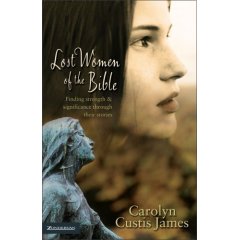Mothers of Mystery

I don't often mention it over here in the blogosphere, but in my other life I have the distinct pleasure of serving as editor in chief of Dallas Seminary's quarterly magazine, Kindred Spirit. It is available in print format and in an (expanded) online version. Some relatives came from Washington, D.C., to our house for the holidays, oops, I mean for Christmas, and at one point my nephew asked some good questions about male pronouns for God in the Bible. We never got to finish our discussion. But on the topic of the Bible and gender, I think it's significant that sprinkled among all the long lists of Zerubbabels and Obeds in Jesus' genealogy, we do find five women. And not just any women. Fascinating women. In the online issue of KS we've featured a video clip of one of our grads, an actress, performing a monologue about the five women in Jesus' genealogy. We also have an article by Elizabeth Inrig titled "Mothers of Mystery: Five Women of Christmas." Though we timed the article for Christmas, the lives of Eve, Tamar, Rahab, Bathsheba, and Mary make for good reading and pondering any time of year.  Tamar, as you may recall, seduced her father-in-law so she could show loyal love to her wicked (and very late) husband. For a fascinating look at how levirate law--that is, how righteousness--probably played into her thinking, check out Carolyn Custis James's new book, Lost Women of the Bible. I highly recommend it. In the past we have been quick to accuse the few women in the Bible of immorality, but maybe we need to relook at that. Mary Magdalene had seven demons cast out of her, but she wasn't a hooker. The Samaritan "woman at the well" probably had not deserted five husbands. From what we know of first-century pratices, she had been deserted by five husbands. And Bathsheba...she was taking a ritual bath at the time David spotted her. So she was apparently concerned with ritual purity. In fact pointing out the ceremonial nature of her practice is how the author signals to the reader that she's fertile: she's taking the bath a godfearing Old Testament woman takes when she's finished with her period and then waited the prescribed number of days. That's not to say these women were perfect. It's just to say maybe there was more going on inside of them than we've explored, pondered, and admired in the past.
Tamar, as you may recall, seduced her father-in-law so she could show loyal love to her wicked (and very late) husband. For a fascinating look at how levirate law--that is, how righteousness--probably played into her thinking, check out Carolyn Custis James's new book, Lost Women of the Bible. I highly recommend it. In the past we have been quick to accuse the few women in the Bible of immorality, but maybe we need to relook at that. Mary Magdalene had seven demons cast out of her, but she wasn't a hooker. The Samaritan "woman at the well" probably had not deserted five husbands. From what we know of first-century pratices, she had been deserted by five husbands. And Bathsheba...she was taking a ritual bath at the time David spotted her. So she was apparently concerned with ritual purity. In fact pointing out the ceremonial nature of her practice is how the author signals to the reader that she's fertile: she's taking the bath a godfearing Old Testament woman takes when she's finished with her period and then waited the prescribed number of days. That's not to say these women were perfect. It's just to say maybe there was more going on inside of them than we've explored, pondered, and admired in the past.